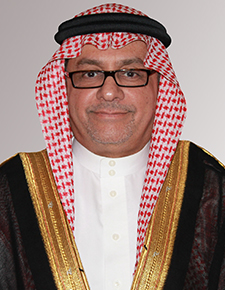SAMA vice-governor looks to add value to the Saudi economy
Saudi Arabia's economy has been flat over the past few years, largely due to the slump in oil prices. However, as the vice-governor of the Saudi Arabian Monetary Authority, Abdulaziz Saleh Al-Furaih, tells James King, the banking sector is performing well, bolstered by newcomers adding value to the country.
Q: How would you characterise the performance of the Saudi Arabian banking sector in 2016?
A: While the financial sector witnessed little credit growth in 2016, the banking sector’s performance remained strong, with a return on equity of 12.3%, a return on assets of 1.9% and a capital adequacy ratio at 19%. The banking sector's non-performing loan ratio was 1.24%, with coverage of 178%. The liquidity position had improved considerably, with a liquidity coverage ratio at 196% and a net stable funding ratio at 125%, as of December 31, 2016.
This shows strong resilience in the banking sector, despite low oil prices and delays in government payments to the private sector during the year 2016, which were regularised before the year end.
Q: In December 2016, Saudi Arabia’s inflation rate fell to its lowest point in 10 years. What is the Saudi Arabian Monetary Authority’s [SAMA's] outlook for inflation in 2017? What are the implications for the Saudi economy?
A: Consumer prices [as measured by the general cost of living index] declined by 0.4% in January 2017 from levels a year earlier. The last time that year-over-year prices declined by this much was in December 2001. Overall prices have actually been declining since July of last year, with the overall index down by 1.2% from its peak.
The inflation rate showed a continued downward trend until it reached 1.7% in December 2016 and declined further in January as a reflection of the receding of inflationary pressures in the economy. In fact, even with administered prices scheduled to increase again in mid-2017, the outlook for inflation remains quite subdued, due to the price weakness in the first half of this year.
The important fact to remember is that inflation is a general and sustained increase in the prices of many products and services resulting from a vicious cycle of both cost-push and demand-pull factors feeding each other.
The increases in the administered prices of energy only impact two out of the 12 categories of consumer prices and are a long overdue necessity designed to conserve the country’s precious natural resources for future generations. With the prices of non-energy-related commodities stable and even declining, and with targeted income support for those citizens most in need of help, the timing is good for these reforms to be implemented.
Q: Is SAMA considering granting more licences to foreign banks?
A: We have recently granted two licences to foreign banks – Qatar National Bank and the Bank of Tokyo-Mitsubishi UFJ – to establish their branches in Saudi Arabia, and are supportive of granting more licences, if needed, under Vision 2030 [a long-term plan to diversify Saudi Arabia's economy]. This makes a total of 26 banks including 12 domestic banks and 14 foreign banks that are currently licensed to do business in Saudi Arabia.
SAMA’s strategy looks at broadening the financial sector to provide opportunities for newcomers who can add value to our financial system. For example, our strategy looks at licensing new institutions that can bring innovation and technology, improve financial inclusion, and improve business in our small and medium-sized enterprise and residential real estate sectors.
Q: What are the implications of the IFRS 9 accounting standard for the Saudi Arabian banking sector?
A: We have conducted an impact study of IFRS 9 on the banking sector in 2016 using half-yearly data. In this study, the impact on capital adequacy ratios [CARs] was minimal, keeping in view high pillar one CAR at 19% as of December 2016. Keeping in view our loan loss coverage ratio of about 178%, we do not foresee any difficulty for our banking sector to absorb increased impairment charges under this new standard, which is applicable from January 1, 2018.
Currently, each bank is carrying out steps to implement IFRS 9 with internal and external resources. SAMA has asked banks to conduct another impact study using December 31, 2016 data. However, we do not expect any major [issues] from these impact analyses.
Q: What is SAMA’s forecast for the Saudi Arabian economy in 2017?
A: Preliminary results indicate that the economy grew by 1.4% in 2016, due primarily to a 3.4% growth in the country’s production of crude oil, natural gas liquids and refined petroleum products. Cutbacks in government spending and a weakness in non-oil exports restrained real non-oil gross domestic product [GDP] growth to a level of 0.2%. This pattern is expected to reverse in 2017, with activity in the oil sector actually declining due to the agreed reduction in crude oil production as part of the Organisation of the Petroleum Exporting Countries’ recent agreement.
However, real non-oil GDP growth is expected to pick up slightly as government spending and worldwide petrochemical prices and volumes stabilise. SAMA expects growth to be sufficient to offset the decline in oil-related real GDP and result in another year of positive growth for the Saudi economy overall.
From an employment and domestic income standpoint, the beneficial impact of this non-oil growth will be magnified, since short-term fluctuations in oil sector production have little or no impact on domestic employment and personal income.
Abdulaziz Saleh Al-Furaih is vice-governor of the Saudi Arabian Monetary Authority.



